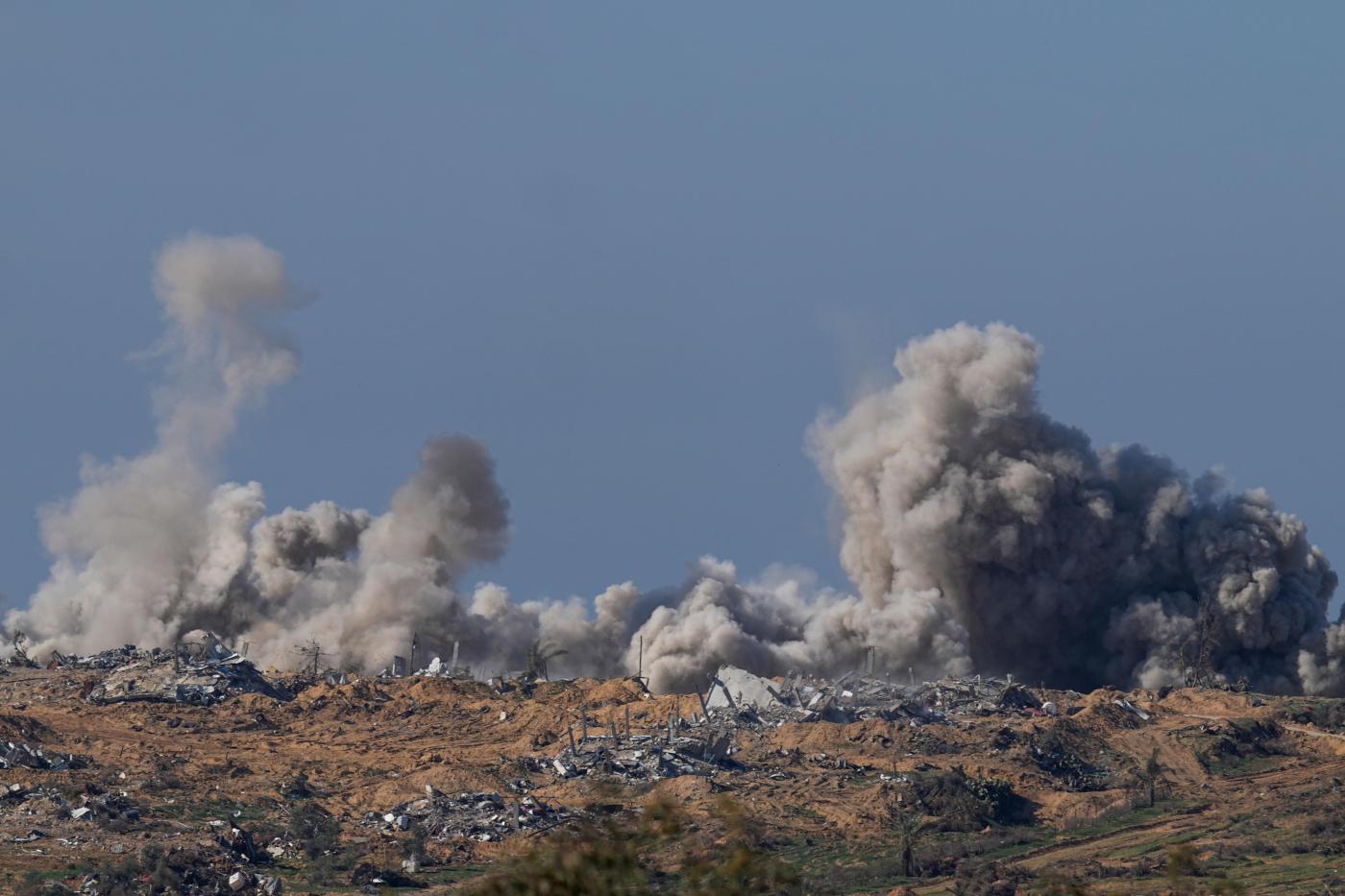
Marc Champion: Saving Gaza means pressing Iran as well as Israel
The gulf between how Israel and much of the world thinks about events in Gaza is growing, and with it the risk of regional escalation. The nature of that disconnect needs to be better understood, and soon, to reduce the threat of a disastrous wider war with Iran.
International attention continues to focus on Palestinian suffering, seen now through the prism of the International Court of Justice in The Hague, where South Africa has accused the Jewish state of genocide. Many in the Middle East and West take Israel’s guilt as a given. For them, after decades spent illegally occupying Palestinian lands, Israel is the problem and the solution is self-evident: The Israel Defense Forces need to stop shooting and leave Gaza.
Within Israel, though, the ICJ case is seen by most as a calumny that only proves antisemitism’s enduring nature. Where, after all, is the case against Hamas, a group committed in its charter to Israel’s destruction? Did it drop leaflets warning people to move to safety before starting its meticulously planned rampage of murder and rape last October? No. It clearly sought to kill as many Jews as it could in the few hours it had.
The merits of the ICJ case are for another column. In the meantime, facts on the ground are changing in favor of escalation. The IDF, despite saying it was shifting to a lighter-touch strategy in Gaza, looks to be digging in for a long war. Houthi attacks launched against international shipping from Yemen, in the name of forcing an Israeli withdrawal from Gaza, have triggered retaliation by the U.S. and U.K. Tit-for-tat exchanges of fire between Hezbollah and the IDF in the north are shifting the attention of Israelis there.
Everywhere in the background stands Iran, which itself just launched missile strikes against targets in Iraq and Pakistan. It was avenging a recent terrorist bombing that it first linked to Israel despite a claim of responsibility by Islamic State.
Recent statements by Israel’s Prime Minister Benjamin Netanyahu can be seen as warning that he considers opening a second front in Lebanon an option. So, too, the assassinations of not just a Hamas leader in Beirut, but also one of Hezbollah’s top military commanders.
“We’re going to bring back safety to the south and to the north,” Netanyahu said in a Jan. 14 nationally televised address marking 100 days since the Oct. 7 attacks. “Nobody is going to stop us, neither The Hague, the axis of evil or anybody else.”
Israel’s more conservative press currently gives the impression that a campaign is underway to build public support for attacking Hezbollah, whose missiles have forced tens of thousands of Israelis from their homes along the border. “Another war beckons,” Jacob Nagel, a former head of Netanyahu’s National Security Council, said in an op-ed he co-authored in the Jerusalem Post.
“The day will come sooner rather than later,” the same newspaper wrote two days later in an editorial, when “Israel will have to unleash its full firepower against Hezbollah.”
Neither Iran, the current U.S. administration nor Hezbollah — mindful of domestic opposition to war in an exhausted, economically spent Lebanon — wants a regional conflagration. But increasingly, Israelis see the root of their problem, and therefore the focus of any potential solution, as Iran.
If you see the world as a game of Risk, you can build a pretty convincing case for action. Iran, after all, has accelerated the rate at which it produces near-weapons-grade uranium, according to the United Nations International Atomic Energy Agency, bringing it closer to a potential nuclear breakout. For now, the estimated 100,000 Hezbollah troops and 150,000 rockets and missiles parked on Israel’s northern border provide Tehran with an insurance policy against any direct Israeli attack to prevent Iran from taking that step.
But if a breakout were to happen, Iran could afford to risk Hezbollah in a fight with Israel. Meanwhile, the Islamic Republic is engaging the U.S. and Israel via proxies — not just in Gaza and Lebanon, but also Iraq, Syria and Yemen — to keep their forces mired in asymmetric, reputation-sapping fights. So why not stop that by destroying Hezbollah, while the group and its Iranian backers, instead of waiting until they’re ready? Why not, to use the unforgettable phrase of Saudi Arabia’s then King Abdullah, cut off the head of the snake by attacking Iran directly?
“One Iranian proxy holds Israeli hostages, kidnapped in Gaza. Another, Hezbollah, holds Israeli and Lebanese populations hostage with their attacks, and now the Houthis are holding the whole world hostage,” Avi Melamed, a former Israeli intelligence official, told me. “People have to understand that this war goes way beyond Hamas. This is a pivotal moment in the trajectory of the Middle East, for the U.S. geopolitical position worldwide, and for story of Arab normalization with Israel.”
And every event that pushes against regional stability, he said, leads back to Iran.
The short answer to the questions posed above is that this isn’t a board game. As should be evident by now, neither the U.S. nor Iran is in full control of either their allies or events. From day one, the Biden administration has been shouting itself hoarse for Israel to adopt a less scorched-earth approach to Gaza, to little effect.
The Houthis have paid still less attention to U.S. warnings, or — for now at least — its missile strikes. Meanwhile, the costs of invading Lebanon, in human and economic terms, almost certainly would be larger in Lebanon than in Gaza. Ballistic missiles would rain on Tel Aviv, and the Israeli response, likely against Beirut, would be devastating.
Yet Iran does see itself as the spider at the center of the web of proxy forces it calls the axis of resistance, and the risk of escalation is real. For now, most Israelis don’t want the IDF to invade Lebanon, but with every exchange of rockets the number who believe there is no choice will grow.
The U.S. and its allies need to find non-military means of pressuring Tehran — from squeezing Iranian oil exports to cyberattacks — to back off or risk that events spin toward a much larger conflict. Changing Israel’s behavior toward the occupied territories is an essential requirement for restoring stability in the Middle East, but it’s only part of the solution.
Israel won’t relent until the root threat posed to it by Iran and its proxies also gets addressed, even once Netanyahu and his extremist coalition are out of the picture. No matter how much you hate U.S. hegemony, only a tougher, braver wielding of sticks and carrots against the governments of both countries is likely to work.
Related Articles
Karl W. Smith: Expanding the child tax credit makes economic sense
David Brooks: Death by a thousand paper cuts
Trudy Rubin: If Israel is accused of genocide, why not Russia?
Lotterman: Ballot challenges to Trump? A healthy function in our rule of law
F.D. Flam: We don’t know how worried we should be about nanoplastics
Marc Champion is a Bloomberg Opinion columnist covering Europe, Russia and the Middle East. He was previously Istanbul bureau chief for the Wall Street Journal.


